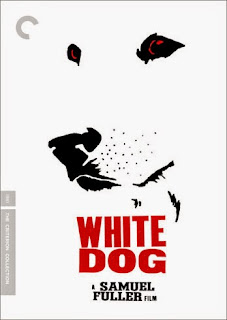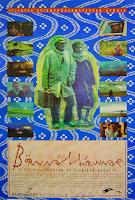I have had a ticket to the one-time only screening of Kornél Mundruczó's
Fehér Isten (White God) for weeks now, and I was extremely excited to see it yesterday.

I was
so excited to see
White God that I got ahold of a copy of Samuel Fuller's
White Dog a couple of days ago and watched that in anticipation. Some thoughts on Fuller's movie first.
White Dog is a movie about a young actress (played by Kristy McNichol) who accidentally hits a beautiful white german shepherd and then cares for it, takes it home, and adopts it. The dog saves her life when a rapist breaks into the house, but the dog also doesn't seem to like her boyfriend very much. Ennio Morricone's eerie score also makes the whole thing seem like we are headed for very bad things.
We are. The white dog starts killing black people. He attacks a garbageman in the middle of the night without getting caught, but then he is on a movie set and attacks Kristy McNichols' friend. Everyone wants her to put this attack dog down. He is a time-bomb waiting to go off, but she wants to have him retrained. This retraining will be attempted by Paul Winfield, who fully commits to the task: It isn't the dog's fault that some racist motherfucker of an owner programmed him to hate dark skin.
 White Dog is a parable of USAmerican racism.
White Dog is a parable of USAmerican racism. It is about racial hatred as a disgusting, learned behavior, but it is also about the way that racism is latent: the dog is loving and sweet and not the least but violent when it is around a person he loves, but then when a black person is around he immediately sees red. And the film asks the question, c
an racism be unlearned, can we learn to retrain our own racist attitudes and begin to see each other with more equality? The end of the film reflects Fuller's own attitudes toward this, certainly, but the film itself is perhaps more interested in the question. As for the
dog,
White Dog is about animals only sofar as it is about training and teaching. A dog, in this sense, is the same as a child in Fuller's film – and the movie makes this explicit in a third-act scene with two small girls.
Just for the record, this is also a very good film. The image of this white dog's beautiful fur covered in blood resounds poetically several times, and we frequently see his mouth dripping with blood, and there is lots of suspense and a great deal to think about in this movie following an attack dog. I loved it.
White Dog was never released in theatres in the U.S. In the early 1980s films about race became less and less common – there were
plenty of great films about race in the 1970s. But in the 1980s
we were supposed to be post-race (you know, like right now), so many many people objected to Fuller's film. It got great reviews in Europe, however, and it was released by the Criterion Collection in 2008 (twenty-six years later) where you can find it on DVD.
* * *
I want, also, to add a side note and say that while waiting to see White God last night I was reading a collection of plays by (the amazing) Adrienne Kennedy and I'll be damned if I didn't read a one-act called A Lesson in Dead Language from 1968 that includes a group of small girls at school learning lessons from their female school teacher who is actually a white dog from the waist up. This was a total coincidence, I swear! The play is about girlhood and menstruation and has nothing to do with any of the movies I'm talking about, but the character is called White Dog.
* * *
Kornél Mundruczó's
White God begins in an abattoir. We watch a man inspect the carcass of a cow. They cut the cow in half. They cut open its belly and its viscera spill out. The man cuts the brain in half and inspects it. Then he stamps it:
cleared for consumption.
In other words, it is clear from the very first moments of White Dog that this isn't a movie only about humans' relationship with dogs but about our relationships with all other animals. Watching this cow being butchered is fairly disgusting, and I was surprised some of the more squeamish in the audience didn't get up and leave right then and there.
The plot of
White God, though, is about a girl named Lili and her dog Hagen. They are separated when her total jerk of a father gets angry at her and abandons the dog on the side of the road. From here we follow the dog and its friend Lili in two different places, sometimes trying to find one another, sometimes forgetting about one another. We follow Hagen (a beautiful brown mixed-breed dog you will love instantly), as he runs from dogcatchers, and then goes into the service of a panhandler/dogseller in Budapest. From here Hagen is purchased and drugged and then trained to be an attack dog. These scenes are very difficult to watch, and I wasn't surprised when several people walked out of the picture at this point.
Some people are kind to the dog. Most are not. And we follow the dog's own journey and from his perspective.
In this way,
White God is, more than anything else, like
Stanislav Rostotsky's beautiful 1977 film White Bim Black Ear (Белый Бим Чёрное Ухо).
White Bim Black Ear is also about a white dog, the runt of a litter, who is adopted by a kind old man and then has a million adventures when the two are separated by the man's illness and the betrayal of an evil neighbor. There are also three children and a schoolteacher who befriend the dog at various points in the dogs picaresque journey across (it would seem) half of the Soviet Union. But this is where
White God's similarity to any other dog film ends.
The reason you need to see White God is that the dog escapes. And the dog raises an army. And the dog comes back for the people who have hurt him. This beautiful animal, who is tortured into becoming an attack dog, forced to kill other animals, leads a revolt – of dogs against the humans who have mistreated them.
All of a sudden, White God becomes a kind of horror film. At one point it occurred to me that I had no idea what kind of movie I was watching anymore. It moves
outside of its genre. It becomes a thrilling and terrifying revenge film, where the revenger is a handsome brown dog, whom we know and understand very, very well.
But, as I said, Mundruczó has made a movie about the ethics of human interaction with animals. This is a film about how we care about the world in which we live and how we care for the other creatures that inhabit that world.
And god? I had simply assumed that
White God was riffing on the title
White Dog,
and now that I've seen both movies I am not totally sure if it is or
not. The original title is in Hungarian where there is no such pun, but
it
must be a riff on Samuel Fuller's title, right? That Mundruczó keeps the word
white in the title, ought to be a clear indication that his film, too, is about racism.
The concept of a "white god" refers to colonialism and the idea that white people could go to other lands and assume a kind of deity, where they fantasized that the inhabitants of these places saw them as gods, where they could order them around, careless of their actual lives, treating them as slaves and creatures less than human. The parallels here are quite clear, and the film is about inequities among humans, as well as inequities among the other beings in our lives: dogs, cows, chickens, and other animals.
Does a dog see a human as a kind of white god, does he look at us, waiting for orders, happy only to serve? Or is that simply our own fantasy about that dog: a fantasy we need so that we can believe in our own superiority, shoring up an idea of what humanity is? The film asks these questions masterfully, and the journey of this is absolutely thrilling.
White God is an absolutely extraordinary film, peopled (haha) with real dogs, not digital re-creations. It is not for the squeamish, but it is not to be missed.
 I am watching a lot of obscure stuff at the moment. This is because I am leaving Dartmouth College after this term and I am trying to watch the most difficult-to-find films that are in the library here but available in few other places. (Last time I was at Dartmouth this meant a lot of 1980s Soviet films. All of which were good!) In any case, I am trying to record these films here so that I remember them.
I am watching a lot of obscure stuff at the moment. This is because I am leaving Dartmouth College after this term and I am trying to watch the most difficult-to-find films that are in the library here but available in few other places. (Last time I was at Dartmouth this meant a lot of 1980s Soviet films. All of which were good!) In any case, I am trying to record these films here so that I remember them.










